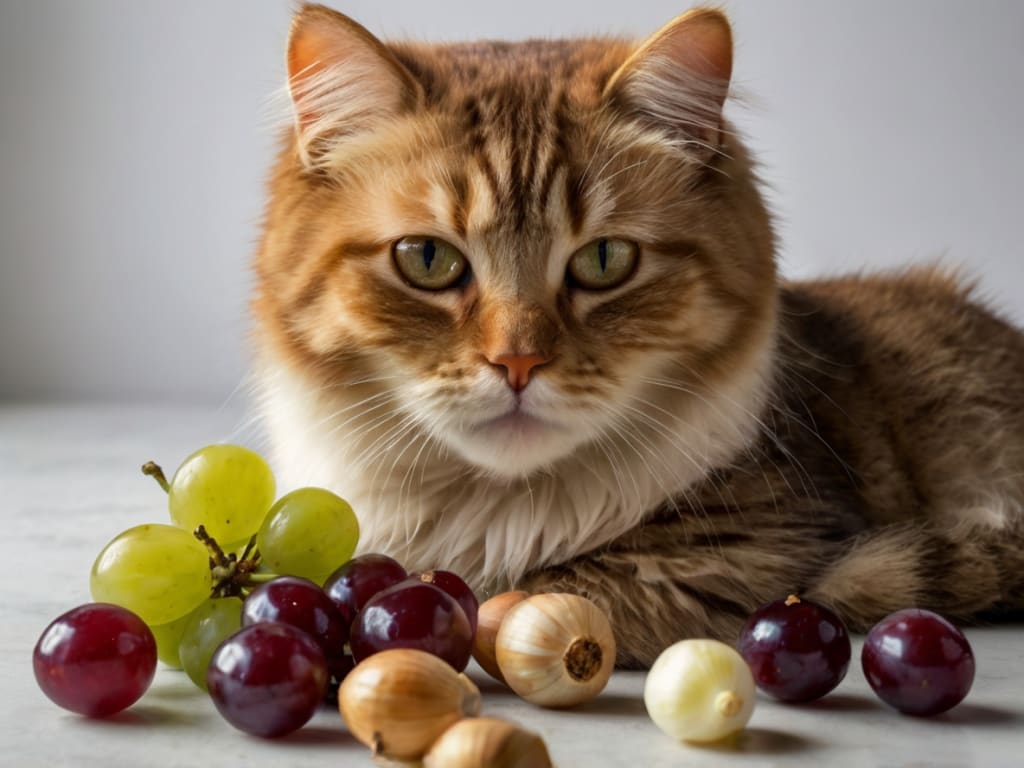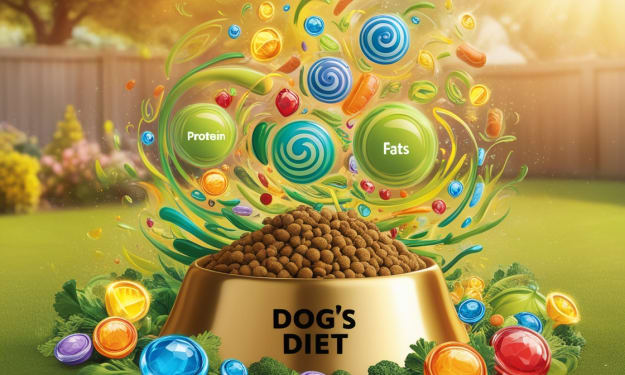Foods to Avoid Feeding Your Cat
Advice from Veterinarians

More details and advices: Foods to Avoid Feeding Your Cat: Advice from Veterinarians
As a responsible cat owner, it's crucial to be aware of the foods that can be harmful to your feline friend. While cats are known for their curious and adventurous nature, their digestive systems are sensitive and can react negatively to certain ingredients. In this article, we'll explore the common foods you should avoid feeding your cat, based on expert advice from veterinarians. By understanding the potential risks, you can ensure your cat maintains a healthy, balanced diet and avoids unnecessary health complications.
Human Foods Toxic to Cats
Chocolate
Chocolate contains two substances that are toxic to cats: theobromine and caffeine. These compounds can cause a range of symptoms, depending on the type and amount of chocolate consumed. The darker and more bitter the chocolate, the higher the concentration of theobromine, and the more dangerous it is for your cat.
Symptoms of chocolate toxicity: vomiting, diarrhea, hyperactivity, increased heart rate, tremors, seizures, and in severe cases, cardiac arrest and death.
Treatment: If you suspect your cat has ingested chocolate, contact your veterinarian immediately. They may induce vomiting, administer activated charcoal to absorb toxins, or provide supportive care such as intravenous fluids and monitoring.
Alcohol
Alcohol is highly toxic to cats and can cause severe health problems even in small amounts. Cats are much smaller than humans and lack the enzymes needed to efficiently metabolize alcohol, making them more susceptible to its effects.
Symptoms of alcohol poisoning: vomiting, diarrhea, decreased coordination, difficulty breathing, tremors, coma, and potentially death.
Treatment: If your cat has ingested alcohol, seek veterinary care immediately. Your vet may provide supportive care, such as administering intravenous fluids, monitoring vital signs, and controlling body temperature.
Grapes and Raisins
Grapes and raisins can cause acute kidney failure in cats. The exact toxic substance and mechanism are not well understood, but even small amounts can be dangerous. It's crucial to keep grapes, raisins, and any products containing them (such as trail mix or baked goods) away from your cat.
Symptoms of grape/raisin toxicity: vomiting, lethargy, abdominal pain, decreased urine output, and kidney failure.
Treatment: Early intervention is critical. If you suspect your cat has eaten grapes or raisins, contact your veterinarian immediately. Treatment may include inducing vomiting, administering activated charcoal, and providing supportive care such as intravenous fluids and monitoring kidney function.
Onions and Garlic
Onions, garlic, and other members of the Allium family (such as leeks, chives, and shallots) contain compounds that can damage a cat's red blood cells, leading to a condition called hemolytic anemia. All forms of these vegetables (fresh, cooked, powdered, or dehydrated) can be harmful.
Symptoms of onion/garlic toxicity: lethargy, weakness, pale gums, increased heart rate, decreased appetite, and discolored urine.
Treatment: If you believe your cat has ingested onions or garlic, contact your veterinarian. Treatment may include inducing vomiting, administering activated charcoal, and providing supportive care such as intravenous fluids and blood transfusions in severe cases.
It's essential to keep these human foods securely out of your cat's reach and to educate family members and guests about the dangers they pose. If you suspect your cat has ingested any toxic substances, don't hesitate to contact your veterinarian or a pet poison control helpline for guidance. By taking preventive measures and acting quickly in case of ingestion, you can help protect your feline companion from the harmful effects of these human foods
Other Harmful Substances
In addition to the human foods mentioned earlier, there are other substances that can be harmful to your cat's health. Some of these substances may be found in your cat's food or environment, making it crucial to be aware of the potential risks they pose. Let's discuss these harmful substances in more detail.
Raw Meat and Fish
While cats are obligate carnivores and require a diet rich in animal protein, feeding them raw meat and fish can be dangerous. Raw diets can harbor harmful bacteria, parasites, and other pathogens that can cause serious illness in cats.
Risks of raw meat and fish: Salmonella, E. coli, Listeria, and Toxoplasma gondii are among the most common pathogens found in raw diets. These can lead to gastrointestinal issues, infections, and even life-threatening conditions.
Thiamine deficiency: Raw fish contains an enzyme called thiaminase, which destroys thiamine (vitamin B1). Thiamine deficiency can cause neurological problems, such as seizures, loss of coordination, and death.
Precautions: If you choose to feed your cat a raw diet, ensure that it is professionally formulated, balanced, and follows strict food safety protocols. Consult with your veterinarian to determine if a raw diet is appropriate for your cat's individual needs.
Dairy Products
Despite the popular belief that cats love milk, many cats are lactose intolerant. This means that they lack the enzyme lactase, which is necessary to digest lactose, the sugar found in milk and other dairy products.
Symptoms of lactose intolerance: Consuming dairy products can lead to gastrointestinal issues such as bloating, diarrhea, and vomiting in lactose-intolerant cats.
Alternatives: If you want to treat your cat, opt for lactose-free cat milk or other cat-specific treats that are formulated to be easily digestible and nutritionally balanced.
Xylitol
Xylitol is an artificial sweetener that is toxic to cats. It is commonly found in sugar-free gum, candy, baked goods, and some dental care products. Ingesting even small amounts of xylitol can be life-threatening for cats.
Symptoms of xylitol toxicity: Rapid onset of hypoglycemia (low blood sugar), weakness, vomiting, seizures, and liver failure.
Treatment: If you suspect your cat has ingested xylitol, seek immediate veterinary care. Your vet may need to monitor your cat's blood sugar levels, administer glucose or dextrose, and provide supportive care to manage liver function.
Household Chemicals
Many common household chemicals can be harmful to cats if ingested or if they come into contact with their skin or eyes. These include cleaning products, pesticides, herbicides, and antifreeze.
Symptoms of chemical toxicity: Vomiting, diarrhea, drooling, difficulty breathing, seizures, and chemical burns on the skin or in the mouth.
Prevention: Keep all household chemicals securely stored and out of your cat's reach. When using these products, ensure your cat is kept away from the area until it is safe.
Treatment: If your cat has been exposed to a harmful chemical, rinse the affected area with clean water (if it is safe to do so) and contact your veterinarian or a pet poison control helpline immediately for guidance.
By being aware of these harmful substances and taking preventive measures, you can help keep your cat safe and healthy. Remember, if you have any concerns about your cat's health or suspect they have ingested a harmful substance, always consult with your veterinarian for prompt and appropriate care.
Safe Alternatives
When it comes to ensuring your cat's health and well-being, providing a balanced, nutritionally complete diet is essential. While it's crucial to avoid harmful human foods and substances, there are plenty of safe alternatives that can help keep your feline friend thriving. Let's explore these options in more detail.
Commercial Cat Food
The most convenient and reliable way to ensure your cat receives the nutrients they need is by offering high-quality commercial cat food. These products are formulated to meet the specific nutritional requirements of cats and are thoroughly tested to ensure their safety and efficacy.
Look for the AAFCO label: When selecting a commercial cat food, check for the Association of American Feed Control Officials (AAFCO) statement on the packaging. This label indicates that the food is "complete and balanced" and meets the nutritional standards for the specific life stage of your cat (kitten, adult, or senior).
Consider your cat's individual needs: Some cats may have special dietary requirements based on factors such as age, breed, size, and health status. Consult with your veterinarian to determine the best type of commercial food for your cat's unique needs.
Wet vs. dry food: Both wet and dry cat foods can be nutritionally complete. Wet food has a higher moisture content, which can help support urinary tract health, while dry food can be more convenient and may help promote dental health through crunching. Many cats benefit from a combination of both wet and dry food.
Veterinarian-Approved Treats
Treats can be a great way to bond with your cat, reward good behavior, and provide mental stimulation. However, it's essential to choose treats that are specifically formulated for cats and approved by veterinarians to ensure their safety and nutritional value.
Healthy ingredients: Look for treats that have high-quality, natural ingredients such as real meat, fish, or poultry. Avoid treats with artificial colors, flavors, or preservatives.
Limited calories: Treats should make up no more than 10% of your cat's daily caloric intake to maintain a balanced diet and prevent obesity. Choose low-calorie options and be mindful of portion sizes.
Dental treats: Some veterinarian-approved treats are specifically designed to support dental health by reducing plaque and tartar buildup. These treats can be a useful addition to your cat's dental care routine, alongside regular brushing.
Fresh Water
Providing your cat with clean, fresh water at all times is crucial for maintaining proper hydration and supporting overall health. Cats have a low thirst drive compared to other animals, so it's important to encourage water consumption.
Multiple water sources: Place water bowls or fountains in various locations throughout your home to make it easy for your cat to access water whenever they need it.
Clean and replace regularly: Wash your cat's water bowls daily and replace the water with fresh, clean water at least once a day. Some cats prefer running water, so consider investing in a pet water fountain.
Monitor water intake: Keep an eye on your cat's water consumption and be aware of any changes in their drinking habits. Increased or decreased water intake can be a sign of an underlying health issue, so consult with your veterinarian if you notice any concerns.
By providing your cat with a balanced commercial diet, veterinarian-approved treats, and plenty of fresh water, you can help support their health and happiness. Always consult with your veterinarian if you have any questions or concerns about your cat's nutrition or if you're considering making changes to their diet. With the right care and attention, you can give your feline companion the foundation they need to thrive.
More details and advices: Foods to Avoid Feeding Your Cat: Advice from Veterinarians
About the Creator
Enjoyed the story? Support the Creator.
Subscribe for free to receive all their stories in your feed. You could also pledge your support or give them a one-off tip, letting them know you appreciate their work.





Comments
There are no comments for this story
Be the first to respond and start the conversation.